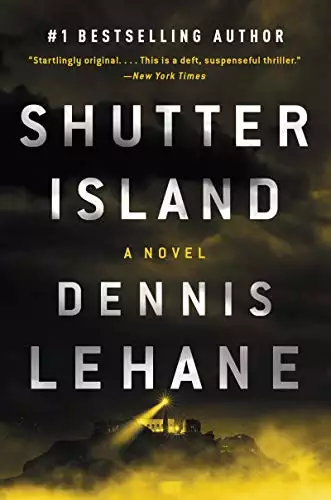Chapter One
Teddy Daniel's father had been a fisherman. He lost his boat to the bank in '31 when Teddy was eleven, spent the rest of his life hiring onto other boats when they had the work, unloading freight along the docks when they didn't, going long stretches when he was back at the house by ten in the morning, sitting in an armchair, staring at his hands, whispering to himself occasionally, his eyes gone wide and dark.
He'd taken Teddy out to the islands when Teddy was still a small boy, too young to be much help on the boat. All he'd been able to do was untangle the lines and tie off the hooks. He'd cut himself a few times, and the blood dotted his fingertips and smeared his palms.
They'd left in the dark, and when the sun appeared, it was a cold ivory that pushed up from the edge of the sea, and the islands appeared out of the fading dusk, huddled together, as if they'd been caught at something.
Teddy saw small, pastel-colored shacks lining the beach of one, a crumbling limestone estate on another. His father pointed out the prison on Deer Island and the stately fort on Georges. On Thompson, the high trees were filled with birds, and their chatter sounded like squalls of hail and glass.
Out past them all, the one they called Shutter lay like something tossed from a Spanish galleon. Back then, in the spring of '28, it had been left to itself in a riot of its own vegetation, and the fort that stretched along its highest point was strangled in vines and topped with great clouds of moss.
"Why Shutter?" Teddy asked.
His father shrugged. "You with the questions. Always the questions."
"Yeah, but why?"
"Some places just get a name and it sticks. Pirates probably."
"Pirates?" Teddy liked the sound of that. He could see them -- big men with eye patches and tall boots, gleaming swords.
His father said, "This is where they hid in the old days." His arm swept the horizon. "These islands. Hid themselves. Hid their gold."
Teddy imagined chests of it, the coins spilling down the sides.<
Later he got sick, repeatedly and violently, pitching black ropes of it over the side of his father's boat and into the sea.
His father was surprised because Teddy hadn't begun to vomit until hours into the trip when the ocean was flat and glistening with its own quiet. His father said, "It's okay. It's your first time. Nothing to be ashamed of."
Teddy nodded, wiped his mouth with a cloth his father gave him.
His father said, "Sometimes there's motion, and you can't even feel it until it climbs up inside of you."
Another nod, Teddy unable to tell his father that it wasn't motion that had turned his stomach.
It was all that water. Stretched out around them until it was all that was left of the world. How Teddy believed that it could swallow the sky. Until that moment, he'd never known they were this alone.
He looked up at his father, his eyes leaking and red, and his father said, "You'll be okay," and Teddy tried to smile.
His father went out on a Boston whaler in the summer of '38 and never came back. The next spring, pieces of the boat washed up on Nantasket Beach in the town of Hull, where Teddy grew up. A strip of keel, a hot plate with the captain's name etched in the base, cans of tomato and potato soup, a couple of lobster traps, gap-holed and misshapen.
They held the funeral for the four fishermen in St. Theresa's Church, its back pressed hard against the same sea that had claimed so many of its parishioners, and Teddy stood with his mother and heard testimonials to the captain, his first mate, and the third fisherman, an old salt named Gil Restak, who'd terrorized the bars of Hull since returning from the Great War with a shattered heel and too many ugly pictures in his head. In death, though, one of the bartenders he'd terrorized had said, all was forgiven. The boat's owner, Nikos Costa, admitted that he'd barely known Teddy's father, that he'd hired on at the last minute when a crew member broke his leg in a fall from a truck. Still, the captain had spoken highly of him, said everyone in town knew that he could do a day's work. And wasn't that the highest praise one could give a man?
Standing in that church, Teddy remembered that day on his father's boat because they'd never gone out again. His father kept saying they would, but Teddy understood that he said this only so his son could hold on to some pride. His father never acknowledged what had happened that day, but a look had passed between them as they headed home, back through the string of islands, Shutter behind them, Thompson still ahead, the city skyline so clear and close you'd think you could lift a building by its spire. "It's the sea," his father said, a hand lightly rubbing Teddy's back as they leaned against the stern. "Some men take to it. Some men it takes."
And he'd looked at Teddy in such a way that Teddy knew which of those men he'd probably grow up to be.
We hope you are enjoying the book so far. To continue reading...
Copyright © 2026 All Rights Reserved
